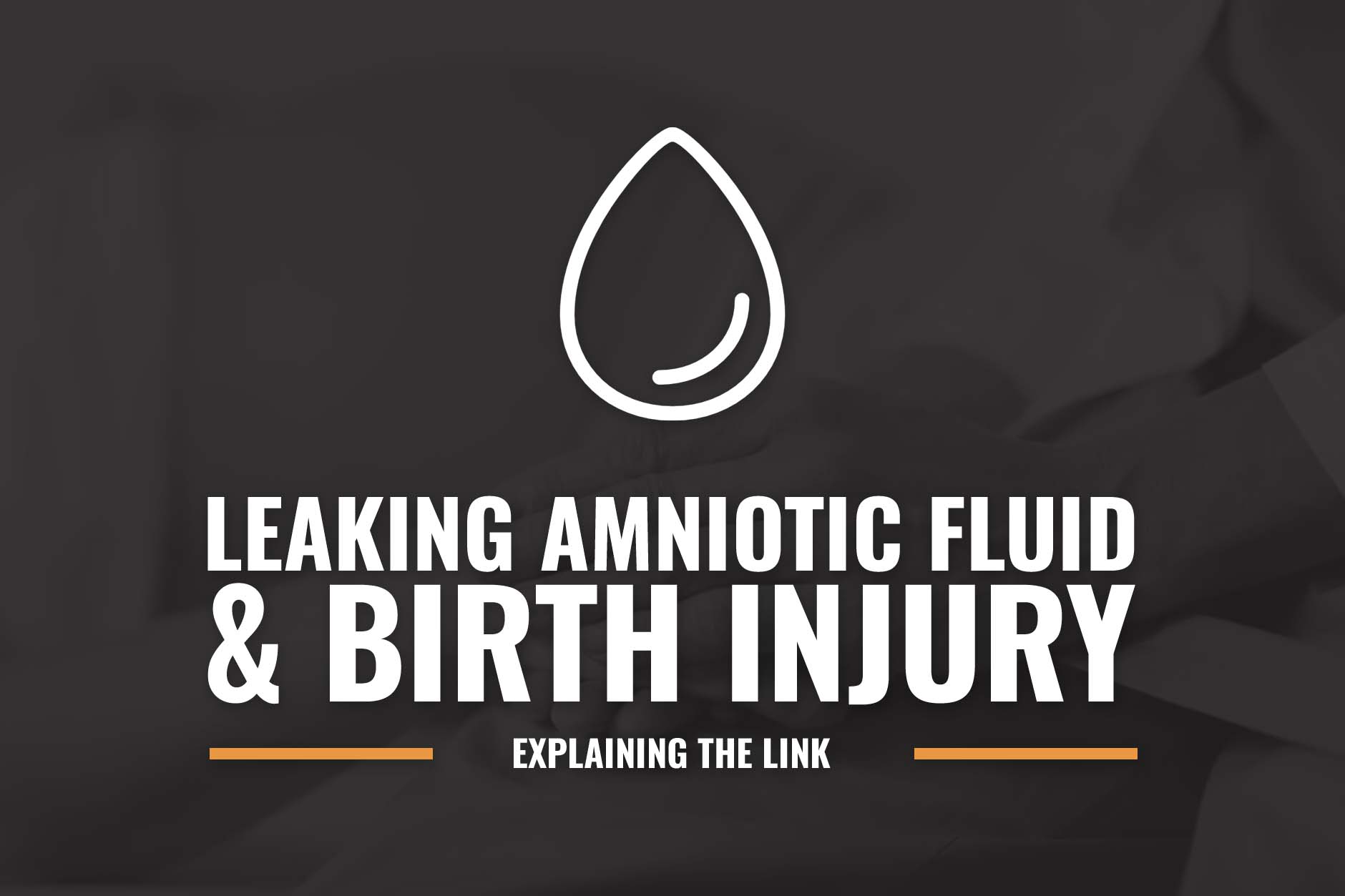
Table of Contents
During pregnancy, the fetus is enclosed within an amniotic sac, a protective bag formed by two membranes. This sac is filled with amniotic fluid, which is essential for the baby’s growth and development. However, when the amniotic fluid begins to leak prematurely, it can lead to severe complications.
At LegalGenius, PLLC, we provide diligent yet compassionate legal representation to families affected by birth injuries. In this blog, we explain the significance of an amniotic fluid leak, how it can signify a critical condition, and how a Michigan birth injury lawyer can help.
What is Amniotic Fluid?
Amniotic fluid is a clear, slightly yellowish liquid that surrounds the fetus within the amniotic sac in the uterus. This fluid plays several critical roles in fetal development. Initially produced by the mother, amniotic fluid is later primarily composed of fetal urine, starting around the 20th week of pregnancy.
Amniotic fluid serves a variety of purposes:
- It cushions the fetus, providing protection from external pressures and potential injuries.
- It allows the fetus to move freely, which is essential for muscle and bone development.
- It helps maintain a stable temperature around the fetus, preventing fluctuations that could be harmful.
- It contains essential nutrients, hormones, and antibodies that support the fetus’s growth and immune system development.
In general, amniotic fluid creates an optimal environment for the fetus to develop by ensuring proper growth and reducing the risk of congenital disabilities. When the levels are too low (oligohydramnios) or too high (polyhydramnios), it can lead to complications. Low levels of amniotic fluid can cause issues with fetal growth and development while high levels can increase the risk of preterm labor and other complications. Deviations from normal levels require close monitoring and, in some cases, medical intervention.
What Does Leaking Amniotic Fluid Mean?
Leaking amniotic fluid, also known as Premature Rupture of Membranes (PROM), occurs when the amniotic sac ruptures before labor begins. This condition can happen at any stage of pregnancy but is particularly concerning when it occurs before 37 weeks, a situation known as preterm PROM (PPROM).
Causes of Leaking Amniotic Fluid
Several factors can contribute to PROM. They include infections in the uterus, cervix, or vagina, which can weaken the membranes. Other causes include excessive stretching of the amniotic sac due to multiple pregnancies or an excessive amount of amniotic fluid.
Certain medical procedures can also increase the risk of PROM. They include:
- Amniocentesis: Amniocentesis is a diagnostic procedure typically performed between the 15th and 20th weeks of pregnancy. It involves inserting a thin needle through the mother’s abdomen into the uterus to collect a small amount of amniotic fluid. This fluid is then tested for genetic conditions, infections, or fetal lung maturity. Although generally safe, amniocentesis carries a small risk of causing PROM due to the puncture of the amniotic sac.
- Cervical Cerclage: Cervical cerclage is a surgical procedure used to treat cervical insufficiency, a condition where the cervix begins to dilate prematurely. The procedure involves stitching the cervix closed to prevent early labor. While cerclage can help maintain pregnancy, the manipulation and suturing of the cervix can sometimes increase the risk of PROM, particularly if the membranes are inadvertently nicked or weakened.
- Chorionic Villus Sampling (CVS): CVS is another prenatal test performed to diagnose chromosomal abnormalities. It is usually conducted between the 10th and 13th weeks of pregnancy. The procedure involves taking a small sample of placental tissue through the cervix or abdomen. Similar to amniocentesis, CVS can increase the risk of PROM due to the invasiveness of the sampling process.
- Intrauterine Device (IUD) Removal: In rare cases, a woman may become pregnant with an intrauterine device (IUD) still in place. If the IUD is removed during pregnancy, the procedure can potentially disrupt the amniotic sac, leading to an increased risk of PROM.
- Multiple Gestations and Fetal Reduction: In pregnancies with multiple gestations (twins, triplets, or more), fetal reduction may be recommended to improve outcomes for the remaining fetuses. This procedure involves the selective reduction of one or more fetuses and can increase the risk of PROM due to the manipulation required within the uterus.
- External Cephalic Version (ECV): ECV is a procedure performed to turn a breech baby into a head-down position before labor begins. While this procedure can be successful in avoiding a cesarean delivery, the manipulation of the fetus and uterus can sometimes lead to PROM.
In cases where PROM occurs due to medical negligence or improper handling of these procedures, seeking legal advice is essential. At LegalGenius, PLLC, we can help you protect your rights and ensure proper care in the aftermath.
Signs and Symptoms of Leaking Amniotic Fluid
Common signs and symptoms of PROM include a sudden gush or a slow, steady trickle of fluid from the vagina. This fluid may be clear, pale yellow, or tinged with blood. Unlike normal vaginal discharge, amniotic fluid has a distinct, somewhat sweet smell. Additional symptoms can include a sensation of wetness in the vagina or on the perineum, and decreased fetal movement, which should prompt immediate medical attention.
Birth Injuries Associated with Leaking Amniotic Fluid
Leaking amniotic fluid can lead to several birth injuries and complications. These risks arise because the protective barrier around the fetus is compromised, exposing the baby to various hazards.
Infection Risk (Chorioamnionitis)
One of the most serious risks of PROM is infection, specifically chorioamnionitis. This infection occurs when bacteria enter the amniotic sac after it has ruptured. Chorioamnionitis can lead to severe complications for both the mother and the baby, including high fever, increased heart rate, uterine tenderness, and foul-smelling amniotic fluid. For the baby, it can result in sepsis, pneumonia, or meningitis, which are life-threatening conditions requiring immediate medical intervention.
Preterm Birth and Associated Complications
PROM often leads to preterm birth, which occurs before 37 weeks of gestation. Preterm infants are at a higher risk for numerous health issues due to their underdeveloped organs. Common complications include respiratory distress syndrome, due to immature lungs, and difficulties in maintaining body temperature and blood sugar levels. Preterm birth can also result in long-term developmental delays and disabilities, impacting the child’s overall quality of life.
Umbilical Cord Complications
Leaking amniotic fluid can also cause problems with the umbilical cord. Two significant issues are cord prolapse and cord compression. Cord prolapse occurs when the umbilical cord slips into the birth canal ahead of the baby, which can compress the cord and cut off the baby’s oxygen supply. Cord compression can happen if there is not enough fluid to keep the umbilical cord from being squeezed during contractions or fetal movements. Both conditions are medical emergencies that require prompt action to prevent severe birth injuries or even stillbirth.
Developmental Issues Due to Lack of Cushioning and Protection
Amniotic fluid provides essential cushioning that protects the fetus from external pressure and trauma. When there is a leakage, the reduced amount of fluid can lead to developmental problems. The fetus may have restricted movement, which is crucial for muscle and bone development. Additionally, the lack of adequate fluid can impede the proper development of the lungs, leading to conditions such as pulmonary hypoplasia. These developmental issues can result in physical disabilities and long-term health problems for the child.
Legal Implications of Birth Injuries Caused by Leaking Amniotic Fluid
Medical negligence occurs when a healthcare provider fails to deliver the standard of care expected in a given situation, leading to harm or injury. Malpractice specifically refers to instances where a healthcare professional’s actions or omissions result in injury to a patient. In cases involving leaking amniotic fluid, negligence can occur at various stages, from diagnosis and monitoring to treatment and intervention.
There are several scenarios where medical negligence related to leaking amniotic fluid can lead to legal action:
- Failure to Diagnose or Treat Leaking Amniotic Fluid: Timely diagnosis and treatment of PROM are critical. Failure to recognize the signs of leaking amniotic fluid or misdiagnosing the condition can delay necessary interventions, increasing the risk of infection, preterm birth, and birth injuries.
- Inadequate Monitoring and Intervention: Once PROM is diagnosed, continuous and appropriate monitoring is essential. Inadequate monitoring of the mother and fetus can result in missed signs of distress or complications, leading to preventable injuries.
- Delayed or Inappropriate Medical Response: Prompt and appropriate medical responses are vital when complications arise. Delayed or incorrect treatment decisions, such as failing to administer antibiotics to prevent infection or not performing a timely delivery when necessary, can have severe consequences.
Parents and their child have the right to expect competent medical care. When this expectation is not met due to negligence, they have the right to pursue legal action. This includes the right to hold healthcare providers accountable for their actions and seek compensation for the harm caused.
Types of Compensation Available in Birth Injury Cases
Families affected by birth injuries due to leaking amniotic fluid can seek various types of compensation, including:
- Medical Expenses: This includes costs for immediate medical treatment, ongoing care, and any future medical needs related to the birth injury.
- Pain and Suffering: This is compensation for the physical pain and emotional distress experienced by both the child and the parents.
- Long-Term Care Costs: If the birth injury results in long-term or permanent disabilities, families may be entitled to compensation for the costs of long-term care, rehabilitation, and special accommodations needed for the child’s well-being.
Steps to Take if You Suspect Leaking Amniotic Fluid
If you suspect that you are leaking amniotic fluid, it’s important to act quickly. First, try to stay calm and avoid activities that might increase the risk of infection or further complications. Lie down and rest to reduce pressure on the amniotic sac. Avoid inserting anything into the vagina, including tampons or douches, as this can increase the risk of infection.
Contact your healthcare provider immediately if you notice a sudden gush or a continuous trickle of fluid from your vagina, especially if it has a distinct smell or is accompanied by other symptoms such as fever, abdominal pain, or reduced fetal movement. Your doctor may perform tests to confirm if the fluid is amniotic fluid and decide on the appropriate course of action, which could include hospitalization, antibiotics, or inducing labor if necessary.
How a Personal Injury Lawyer Can Help
Dealing with a birth injury caused by leaking amniotic fluid can be distressing for any family. A personal injury lawyer will help you fight to hold medical professionals accountable for any failure to provide the standard of care. This includes investigating the circumstances surrounding the birth injury, identifying negligence, and fighting for the rights of the affected family.
Building a strong case requires thorough evidence gathering. Your lawyer will collect medical records, expert opinions, and witness statements to establish that negligence occurred and directly caused the birth injury. They may also consult with medical experts who can provide professional assessments of the care provided and the resulting injuries.
Once sufficient evidence has been collected, your lawyer will negotiate with the insurance companies involved to secure a fair settlement. If negotiations fail, they will be prepared to take your case to trial to seek the compensation you deserve.
Importance of Choosing an Experienced Birth Injury Lawyer
Choosing a lawyer with experience in birth injury cases is essential. An experienced lawyer understands medical malpractice law and has the skills necessary to handle the challenges of these cases. They can provide knowledgeable guidance and make sure that your case is handled with the utmost care and attention to detail. Their legal acumen can help secure the compensation needed to support your child’s future.
Get a Free Consultation From a Michigan Birth Injury Lawyer
Leaking amniotic fluid is a serious condition that can lead to serious birth injuries if not promptly and properly managed. In cases where medical negligence may have contributed to the condition, a personal injury lawyer can help you secure an outcome that protects your baby’s future.
At LegalGenius, PLLC, we understand the profound impact that these injuries can have on infants and their parents. If your family has been affected by a birth injury related to leaking amniotic fluid, we are here to help. For more information or to schedule your free consultation, fill out our Ask the Genius™ form or call (800) 209-4000 today.

Attorney Jeffrey Perlman
Attorney Jeffrey Perlamn is the managing partner at LegalGenius, PLLC. He has helped Metro Detroit accident victims recover the compensation they deserve for over 35 years. He believes everyone should have access to justice and the legal system, which is why Attorney Perlman spends his time outside of the courtroom writing informational blogs on the LegalGenius website that are accessible to all.


